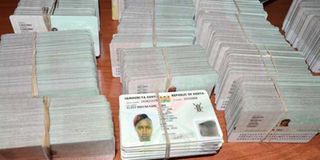New IDs will be valid for 10 years due to microchip - State

Uncollected ID cards.
What you need to know:
- The government has explained that the microchip in the ID cards has a shelf life of a decade.
- Civil society organisantions demanded answers over the rationale of expiry date on the cards.
You will be required to renew your new national identification card called Maisha Card every 10 years, the government has said, as it seeks to allay fears over the purpose and safety of the IDs.
Immigration and Citizenship Services Principal Secretary Julius Bitok on Monday said the renewal was necessary because the microchip in the cards, “just like other documents, such as ATM cards,” has a shelf life of a decade from the date of issuance.
“The expiry date has no direct correlation with the general election date,” Bitok said as he sought to allay fears that the card was part of a plot to rig the 2027 General Election in favour of President William Ruto.
“This is a standard practice in countries such as Uganda, Tanzania, Nigeria, Senegal and France, among others that have implemented an ID with a microchip,” Bitok said.
On Sunday, civil society organisantions demanded answers over the rationale of the expiry date on the cards.
“IDs are critical in matters to do with voting, we want an explanation. It raises a lot of suspicions and one can see it is a scheme to rig elections in 2027,” the organisations said.
The PS further clarified that those seeking to renew expired ID cards will not need to undergo fresh biometric registration but will retake passport-sized photos due to potential changes in facial features over time.
“The National Registration Bureau (NRB) appreciates the importance of the National ID Cards as a constitutional right and essential identification document and will strive to ensure eligible Kenyans obtain it as soon as possible,” he stated.
“To meet the rising demand for services, NRB has acquired a modern printer and enhanced the printing capacity to 30,000 National ID cards per day against the average demand of 10,000 applications.”
The introduction of the Maisha Card in November 2023, the PS said, followed extensive public and stakeholder engagements, including 820 consultations with civil society, religious leaders, the private sector, media, and the public.
Since its launch, NRB has issued 972,630 Maisha cards, comprising 531,329 new applications and 441,301 duplicates.
Mr Bitok emphasised that the Maisha Card ecosystem adheres to regional and international best practices for personal registration documents.
“The system enhances security features in the National ID card, making it difficult to forge and tamper with digital ID features that enable a digital version of the cards,” he said.
He addressed concerns raised by civil society regarding the legality and efficacy of the Maisha Card, stating, “It consolidates several existing databases into a master national register, negating the need for multiple and separate personal registration records.”





